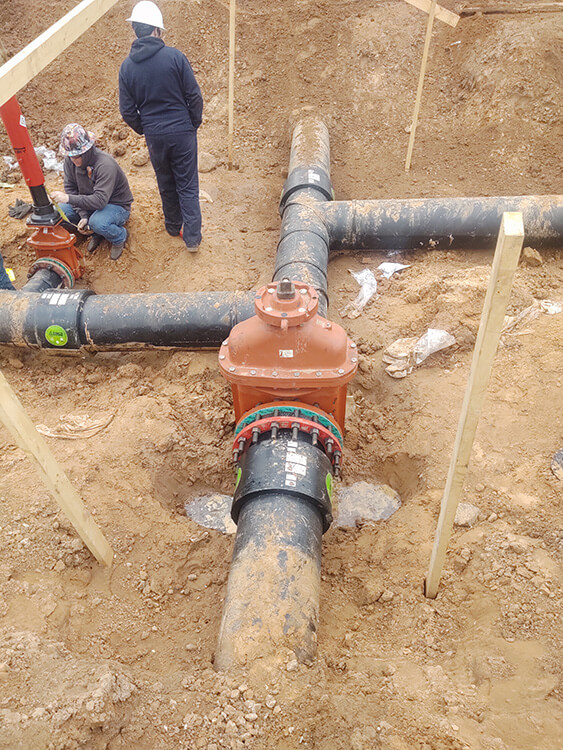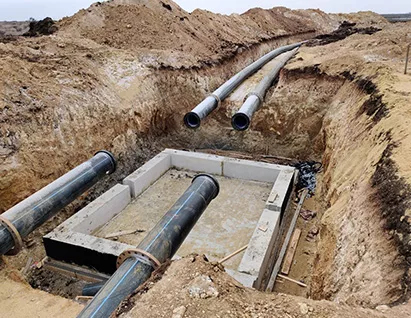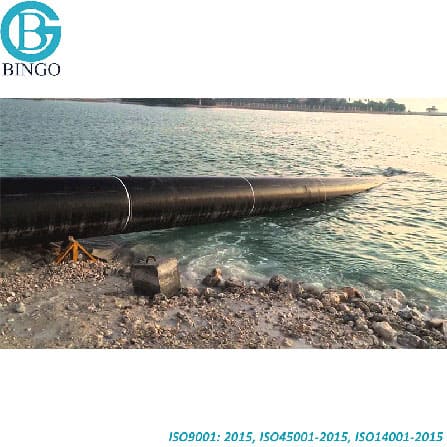The step-by-step resource to selecting the best HDPE Pipe Supplier
Wiki Article
Pipeline Manufacturer Limelight: Discover the most effective in the Sector for Your Next Task
In the domain name of pipeline manufacturing, the option of maker can considerably influence the outcome of your project. With a selection of companies using cutting-edge services and innovative materials, understanding the essential standards for option comes to be vital. Sector leaders like Tenaris, Vallourec, and United State Steel are at the forefront of offering trusted and sustainable choices. Nevertheless, the concern continues to be: what details factors should direct your decision-making process, and exactly how do these suppliers differentiate themselves in an increasingly open market? Discovering these elements might disclose understandings that could influence your following job's success.Sector Summary
In the pipeline manufacturing industry, there exists a vibrant interaction of technological innovations and regulatory requirements that shapes industry methods. This industry is vital for the transport of oil, gas, water, and various other liquids, requiring a robust understanding of both product buildings and ecological impacts. Manufacturers are increasingly incorporating innovative products and cutting-edge production techniques to improve the longevity and efficiency of pipelines, guaranteeing they can withstand varying stress and environmental conditions.
Additionally, the increase of digital innovations has changed typical manufacturing procedures, allowing for enhanced tracking and predictive maintenance. This shift not only boosts operational effectiveness however likewise helps in mitigating possible failures before they rise into crucial concerns. Generally, the landscape of pipeline manufacturing is characterized by a continual development driven by advancement and compliance, positioning the field for future growth and sustainability.
Trick Requirements for Option
Choosing the right pipeline supplier involves mindful consideration of a number of key standards that assure dependability, performance, and compliance with sector standards. Examine the manufacturer's experience and track record within the sector. A well-established business with a tried and tested performance history is most likely to deliver high-grade services and products.Next off, evaluate the variety of specifications and materials used. Manufacturers need to provide a range of choices that deal with varied task needs, including different pipeline dimensions, products, and layer systems. Conformity with relevant industry requirements, such as ASTM or API, is critical, as it assures the products meet safety and performance benchmarks.
Furthermore, take into consideration the producer's technological capabilities. Advanced production strategies and top quality control actions can significantly impact the sturdiness and efficiency of the pipelines. Client service and support are likewise critical; a responsive and well-informed group can promote smoother job execution and deal with any concerns without delay.
Examine prices structures and lead times. While cost-effectiveness is essential, it needs to not jeopardize quality. Stabilizing these requirements will lead to an educated decision that aligns with task goals and regulatory needs.
Top Pipeline Manufacturers
In the affordable landscape of pipeline manufacturing, a number of industry leaders stand out for their cutting-edge modern technologies and commitment to sustainability. These leading makers not only succeed in providing premium products yet additionally focus on ecologically accountable practices in their procedures. A summary of their payments offers valuable understandings into the future of pipeline solutions.Market Leaders Summary
How do industry leaders form the pipeline manufacturing landscape? The top pipeline producers play a vital duty in establishing sector requirements, driving innovation, and guaranteeing quality control throughout the supply chain. Firms such as Tenaris, Vallourec, and U.S. Steel have actually set benchmarks for sustainability, performance, and safety, influencing not just their operations however additionally their rivals.These leaders spend considerably in r & d to enhance product toughness and performance. Their dedication to sticking to governing conformity and international requirements promotes customer depend on and urges industry-wide fostering of ideal practices. They frequently collaborate with stakeholders, including designers and building and construction companies, to ensure that their products fulfill certain job demands and environmental considerations.
Market leaders additionally focus on client relationships, offering customized options and exceptional solution, which enhances their market setting. By leveraging economic climates of scale, they can supply competitive rates without endangering high quality. Inevitably, the influence of these makers extends beyond their items; they shape the future of pipeline technology and manufacturing procedures, ensuring a resilient and sustainable framework for different industries worldwide.
Cutting-edge Technologies Provided
What cutting-edge innovations are transforming the pipeline manufacturing market? Over the last few years, leading pipeline manufacturers have actually embraced sophisticated modern technologies to enhance performance, reliability, and security in their procedures. One significant advancement is the assimilation of wise pipeline surveillance systems, utilizing Web of Points (IoT) sensors. These systems give real-time data on pipeline problems, enabling aggressive upkeep and minimizing the risk of leakages or failures.
In addition, producers are increasingly adopting innovative materials, such as composite pipes, which use enhanced sturdiness and resistance to corrosion. These materials not just expand the life expectancy of pipes but likewise lower operational costs in time. Additive manufacturing, or 3D printing, is revolutionizing the production process. This modern technology permits rapid prototyping and modification of parts, enhancing supply chains and minimizing waste.
Fabricated knowledge (AI) and machine knowing formulas are likewise acquiring traction, optimizing style processes and predictive maintenance routines. By evaluating large datasets, these technologies help recognize possible problems before they arise, boosting safety and security and functional effectiveness. As these ingenious innovations continue to evolve, they promise to form the future of pipeline manufacturing, ensuring that projects can be completed on schedule and within budget plan while keeping the utmost safety and security requirements.
Sustainability Practices Highlighted
The continuous improvements in ingenious modern technologies within the pipeline manufacturing sector are enhanced by a growing focus on sustainability methods among leading producers. These companies are significantly embracing green techniques, decreasing waste, and minimizing their carbon impacts throughout the production procedure.Leading producers are focusing on using recycled materials, enhancing the lifecycle of their items. By carrying out closed-loop systems, they effectively use sources, consequently decreasing the environmental influence connected with resources extraction and handling. Furthermore, many companies are buying renewable resource sources to power their procedures, additionally reducing greenhouse gas exhausts.
Pipeline producers are accepting sophisticated layers and products that improve corrosion resistance and longevity, which ultimately decreases the frequency of replacements and repairs. These sustainable practices not only add to environmental stewardship but also line up with the expanding regulative needs and market assumptions for liable manufacturing.
Cooperation with stakeholders to foster sustainability campaigns showcases a commitment to a greener future. By focusing on sustainable techniques, top pipeline manufacturers are not only boosting their operational performance however additionally establishing a standard for sector standards, advertising an extra sustainable pipeline facilities for all.
Ingenious Technologies
The pipeline market is seeing a transformative shift via the assimilation of cutting-edge innovations, particularly in advanced products advancement and wise pipeline monitoring systems. These advancements not just improve the toughness and effectiveness of pipelines yet likewise boost safety and security and environmental stewardship. As producers embrace these innovative services, the future of pipeline infrastructure looks progressively promising.Advanced Materials Growth
Advancements in advanced materials growth are revolutionizing the pipeline manufacturing market, driving improvements in toughness, efficiency, and performance. The development of composite materials and high-strength alloys has allowed the manufacturing of pipelines that can endure severe problems, consisting of high pressure and corrosive atmospheres. These products not just extend the life expectancy of pipes yet also lower maintenance prices, ultimately resulting in boosted operational efficiency.
In addition, improvements in polymer science have brought about the development of lightweight, adaptable piping systems that are much easier to set up and transfer. These developments contribute to reduce carbon impacts in pipeline tasks, straightening with worldwide sustainability objectives. Furthermore, the combination of nanotechnology in product advancement is opening up brand-new opportunities for improving the mechanical properties of typical products, resulting in pipelines that can endure higher stress while preserving stability.
As manufacturers proceed to purchase study and advancement, the pipeline sector is seeing an unprecedented advancement in material abilities. This concentrate on sophisticated products not only sustains the expanding demand for reputable infrastructure however also promotes a competitive landscape where companies can separate themselves through premium item offerings. The future of pipeline manufacturing is certainly intertwined with these groundbreaking innovations.
Smart Pipeline Keeping Track Of Equipments
Smart pipeline monitoring systems are transforming the landscape of pipeline administration by incorporating sophisticated innovations such as IoT sensing units, fabricated intelligence, and real-time data analytics. Pipeline Manufacturer. These systems allow operators to check the integrity and performance of pipelines constantly, considerably decreasing the danger of failings and leakagesVia the release of IoT sensing units along pipeline routes, operators gather vital information on circulation, temperature level, and stress rates. This information is transmitted in real-time to central surveillance systems, enabling prompt analysis and feedback to abnormalities. Advanced expert system algorithms analyze this data to recognize patterns, forecast prospective problems, and suggest preventative steps before they escalate right into pricey troubles.
The application of wise monitoring systems not just boosts operational efficiency but also cultivates conformity with regulative requirements. By offering in-depth reports and insights, these technologies sustain far better decision-making and risk administration. In addition, the integration of maker understanding abilities enables systems to improve with time, adapting to altering conditions and enhancing anticipating precision.
As the market continues to welcome these innovations, clever pipeline tracking systems are poised to play a crucial role in making certain the safety, integrity, and sustainability of pipeline infrastructure. HDPE Pipe Supplier.

Study of Success
Success tales within the pipeline manufacturing industry light up the efficiency of cutting-edge options and collaboration amongst stakeholders. One notable situation is the collaboration in between a leading manufacturer and an oil business to execute a modern wise pipeline tracking system. The task considerably reduced leakage discovery times and enhanced operational performance, showcasing the value of advanced modern technology in boosting security and reducing prices.One more example entails a maker that successfully incorporated sustainable products into their pipeline construction. By teaming up with research study institutions, they created a composite material that is not just resilient but additionally ecologically pleasant. This advancement not only fulfilled regulative requirements but likewise drew in new clients looking for sustainable solutions.
A pipe job in a tough geographical region demonstrated the relevance of adaptive design strategies. The producer teamed up with local engineers to make a pipeline that could hold up against extreme weather condition problems, ultimately stopping solution disruptions and making sure integrity for end-users.
These instance studies exemplify just how tactical collaborations, technical advancements, and adaptive options in the pipeline manufacturing sector bring about effective job end results, thereby enhancing the sector's dedication to supplying top quality facilities while attending to client needs successfully.
Sustainability Practices
As the pipeline manufacturing industry advances, the combination of sustainability methods has come to be progressively essential. Manufacturers are adopting eco-friendly products and processes to minimize their ecological effect while maintaining high criteria of high quality and safety and security. This change is driven by both regulatory needs and a growing recognition of environmental duty among stakeholders.
One prominent technique is the use of recycled products in pipeline production, which lowers the demand for virgin sources and decreases waste. Firms are also spending in energy-efficient manufacturing techniques, consequently lowering their carbon impact during production. In addition, numerous manufacturers have actually adopted water preservation practices, making sure that water use is reduced and wastewater is dealt with efficiently.
Lasting transportation techniques are being utilized to supply materials, consisting of enhancing logistics to reduce exhausts. The dedication to lifecycle evaluations enables producers to assess the ecological impact of their products from beginning to disposal, promoting not just sustainability yet also lasting economic feasibility.
Ultimately, the adoption of sustainability techniques in pipeline manufacturing indicates an essential step toward aligning industry procedures with worldwide ecological goals, making sure that future tasks are both cutting-edge and liable - Permian Basin HDPE Pipe Supplier. you can try here - HDPE Pipe Supplier
Future Fads in Pipeline Manufacturing
What technologies are on the horizon for pipeline manufacturing? As the industry advances, a number of essential fads are forming the future of pipeline production. The combination of advanced products such as composite pipes assures improved durability and resistance to rust, thereby expanding the life expectancy of pipelines. These materials not only reduce maintenance expenses but additionally improve safety and security standards.

Sustainability continues to be a critical emphasis, with suppliers significantly focusing on eco-friendly practices. The development of eco-friendly products and the implementation of recycling programs are acquiring traction, lining up with international ecological goals.
Regularly Asked Inquiries
What Products Are Typically Utilized in Pipeline Manufacturing?
Typical materials made use of in pipeline manufacturing include carbon steel, stainless-steel, polyethylene, and ductile iron (American Plastics LLC HDPE Pipeline Manufacturer). Each material supplies distinct advantages pertaining to strength, rust resistance, and viability for various applications within the pipeline industryHow much time Does the Pipeline Manufacturing Process Normally Take?
The pipeline manufacturing procedure generally varies from a couple of weeks to several months, depending upon variables such as product choice, manufacturing ability, and customization demands. Reliable preparation and coordination can substantially influence the overall timeline.What Are one of the most Common Pipeline Sizes Available?
The most usual pipeline sizes range from 2 inches to 48 inches in diameter. Irregularity exists based upon particular applications, market standards, and regional demands, guaranteeing versatility to satisfy diverse project demands and operational needs.Exist Service Warranties Offered on Pipeline Products?
Yes, many pipeline manufacturers offer service warranties on their items, commonly covering product flaws and craftsmanship. The duration and terms of these warranties differ by maker, so it is important to examine certain policies prior to acquisition.Exactly how Do I Guarantee Proper Installment of Pipes?
To ensure appropriate installation of pipes, comply with industry criteria, use qualified specialists, carry out extensive site analyses, execute quality assurance actions, and safe compliance with regulations. Routine evaluations and maintenance further boost pipeline performance and longevity.Pipeline suppliers are welcoming sophisticated finishes and products that enhance deterioration resistance and longevity, which inevitably reduces the regularity of replacements and repair services. The pipeline industry is experiencing a transformative change with the assimilation of innovative modern technologies, specifically in innovative materials advancement and clever pipeline monitoring systems. As producers proceed to spend in research and advancement, the pipeline sector is seeing an extraordinary evolution in material abilities. Smart pipeline surveillance systems are changing the landscape of pipeline management by integrating sophisticated technologies such as IoT sensors, synthetic knowledge, and real-time information analytics. Yes, many pipeline makers supply warranties on their products, commonly covering material flaws and handiwork.
Report this wiki page